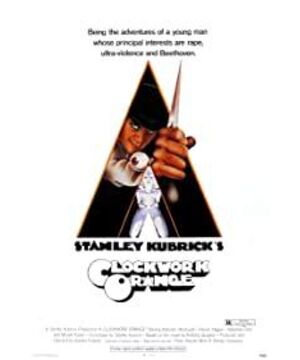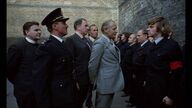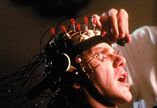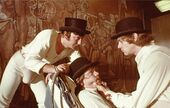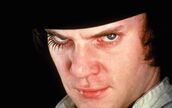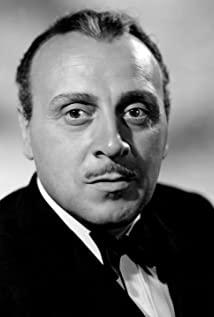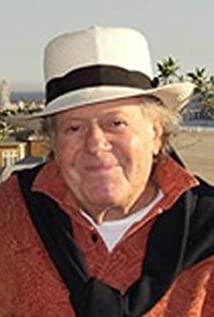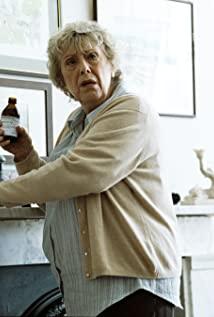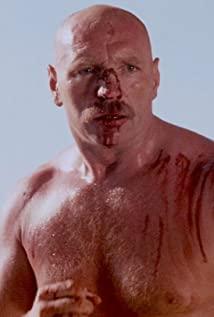10/10
I thought it was the best Kubrick.
【What is "Clockwork Orange"】
Alex is undoubtedly the "clockwork orange", his appearance has all the appearance of organic life, but after transformation, like a doll that has been wound up, the original fresh and juicy life has become shriveled and withered.
Who on earth installed this clockwork machine for him? It's not a certain politician, a certain party, the warden of a certain prison, a doctor in a certain hospital, or even those villains who have had personal grudges against him, but the invisible political machine, which is invisible but also has Shape, because it comes from the interaction of all forces in society, it comes from every molecule that participates in the operation of society, although it has been abstracted to the point that no individual can grasp it.
The fact that Alex became a Clockwork Orange happened in at least two senses:
First of all, it is the specific mechanistic transformation of his brain that the doctor fakes in the name of "scientific" and "transformation". A pair of hands fiddles with his brain, and through physical therapy and drug control, he is transformed into what power desires. The appearance of becoming, using scientific means, using mechanistic and Pavlovian treatment methods, allows people to form mechanized conditioned reflexes, and transform their minds and souls by transforming their bodies.
The second is the abstract control of his fate by political power. Different political parties play Alex in the palm of their hands for their own political purposes, shaping him like plasticine in the way that is most beneficial to him in gaining popular votes. Alex is violent, of course, but this kind of violence is not worth mentioning before state violence - the disparity in power between the two is that the audience is bounded by the middle of the film, resulting in an emotional transformation of the characters (from distanced suspicion to empathy and empathy) ) main reason.
If the misdeeds and hooliganism of the delinquent teenagers in the first half are full of absurdity and irrationality, they are driven by the id of desire, collide with animals, and have all the five poisons; The uncontrolled state has entered the state of being severely disciplined and the clockwork has been tightened, and the journey of being healed and rescued by "science" and "rationality" has begun, but the second half is the real madness and terror. , moral decay, hysteria.
[Foucault-esque film]
A Clockwork Orange is a quintessential Michel Foucault film, its discourse on power and governmentality in Discipline and Punishment and on bio-politics The elaboration of this concept is directly reflected in the film.
The old way of punishing criminals is to confiscate their personal freedom, fix their scope of activities in a specific physical space, and try to make them better through religious guidance and influence. In the film, this approach is obviously useless against a group of rascals who are in prison, lose their names and are transformed into strings of digital codes, listen to priests every day, and have a presence in the library Reading the Bible soberly, even reciting every sentence in it, but a montage of images in Alex's mind as he reads the Bible almost causticly points out Alex's hopelessness and the futility of this form of punishment. :
When he read about Jesus being tortured on the cross, he imagined himself as a soldier dressed in Roman military service.
Violence and sex were still in his mind. The punishment and education model in prison not only failed to clarify the "bad thoughts" in his mind, but instead gave him a richer imagination.
The difference between the two modes of discipline is directly illustrated by the warden's remarks when introducing this new therapy to Alex:
"The government can't be concerned any longer with outmoded penalogical theories. Soon we may need all prison space for political offenders. Common criminals are best dealt with on a purely curative basis. Kill the criminal reflex, that's all. Punishiment means nothing to them, you can see that, they enjoy their so-called 'punishment." "These new ridiculous ideas have come at last... Though I may say to you in confidence, I do not approve. An eye for an eye, I say. If someone hits you, you hit back, do you not? Why should not the state, severely hit by you hooligans, not hit back also? The new view is to say 'No.' The new view is that we turn the bad into good... You are to be reformed."
The loss of freedom and dignity is undoubtedly a punishment for criminals, but the new view is more "humane", rejecting this "punishment" attitude, and taking "treatment" as the fundamental purpose. If the punishment method in the past is to limit the personal freedom of criminals to give crimes commensurate with their criminal behavior, and try to warn potential criminals to voluntarily give up possible crimes by strengthening the symbolic association of "crime-prison" behavior; then the new method has no intention of doing this at all, it appears in the face of modern medicine, and uses a set of vocabulary without any negative expressions to "care" all heretics in the name of "treatment", and build it into the expectation of power looks like. For criminals, the purpose of punishment is no longer, but the focus should be on "reform", transforming them into "useful" people who can be put back into social production.
The specific method of this "treatment" is to act directly on the body, rather than directly starting from the soul like religious belief. After the first treatment, Alex said to the doctor "It was horrible." The female doctor said to him, "Of course it was horrible. Violence is a very horrible thing. That's what you are learning now. Your body is learn it."
It can be seen that the transformation of Alex did not make him a spontaneous good person from the inside out. This method of transformation is nothing more than always sliding against the surface of the body, and correcting the "patient"'s behavior through behaviorist therapy purely from the results .
The priest in the film undoubtedly plays the role of questioning this logic. When Alex said to the pastor in prison, "I just want to be good. I want for the rest of my life to be on act of goodness.", the pastor reminded him, "The question is, whether or not this technique really makes a man good. Goodness comes from within. Goodness is chosen. When a man cannot choose, he ceases to be a man." The key is not the result of good and evil, but the right to choose. A person can be called a good person because he has made a choice to be good; and when a person cannot make a choice out of free will, whether he can still be called a person is a question mark.
When Alex was shown to the public by politicians at the end of his first treatment, the pastor took the stage again to express his opinion:
"The boy has no real choice, has he? Self-interest, the fear of physical pain drove him to that grotesque act of self-abasement. Its insincerity was clear to be seen. He ceases to be a wrongdoer; he ceases also to be a creature capable of moral choice."
And the pastor's generous statement can be refuted with only two words of politicians - "it works!" The effective result makes the pastor's statement seem a little downcast. Here's what politicians say: "Padre, these are subtleties. We're not concerned with motives, with the the higher ethics. We are concerned only with cutting down crime, and with relieving the ghastly congestion in our prisons. The point is that it works !"
The question for politicians, however, is at what level is such a treatment "effective"? From a behavioral standpoint, this approach may work, but it's not the only dimension to consider when thinking about it. When confronted with such questions, it is precisely the subtleties that politicians disdain that constitute the key element that is lacking in their discourse.
We are in the "biopolitics" that Foucault said. Life has become an existence that needs to be carefully cared for and cared for by power. Population, life expectancy, and happiness index have become objects that need to be managed, one by one. The indicators of life It has become the ultimate meaning that politicians care about. The motives of all these are so "humane" and so "scientific", but what they may ultimately lead to is precisely the end of world wars, genocide, and totalitarian rule. We can shout "It works!" and defend all behaviors that violate human ethics, and we can usher in a "Brave New World", where all people can obtain the ultimate victory experience and emotion through happiness potions or chemical drugs Gao Feng, all behaviors that are contrary to "normal" and "healthy" - Internet addiction, homosexuality, dissent - can be corrected, cured, Transform into the obedient, obedient, impersonal and lifeless "Clockworker" and Frankenstein welcomed and encouraged by the social machine.
However, such questioning itself can also raise another question: what exactly is "from the heart"? Is there really such a thing as "from the heart"? Are people really capable of making "autonomous" choices? Is it wishful thinking when we think we make a "heart" choice? This may be an eternal philosophical question. If people really don't have any subjectivity, then the whole story of A Clockwork Orange loses any sense of tragedy. It's nothing but a sober statement of an inconsequential fact, like today's weather is cloudy and sunny.
【Sex, Violence and Art】
In films, sex and violence are often intertwined with classical music and art: Beethoven's symphonies and violence and disturbing videos; "Sing in the Rain" and rape...
Such juxtapositions have a paradoxical power: on the one hand, Alex's encounter in the film is due to this conditioning-based behavioral therapy; on the other hand, the juxtaposition itself The audience declares the objective existence of "conditioned reflex" - after watching the movie, when "Song in the Rain" or Beethoven's Ninth Symphony sings in the audience's ears again, a different picture will emerge in their minds from before.
Thus, in watching a film that ridicules and criticizes the manipulation of the human body by external stimuli, this message is conveyed to the audience precisely through a similar stimulus: inside the screen, Alex is swept up by a giant state machine. manipulate; off-screen, the audience is being manipulated by the genius Kubrick.
And it also points to the hidden connection between art and violence and sex. According to the point of view of psychoanalytic theory, the source between art and the two is the same, libido is both the driving force of sexual desire and destructive desire, and also the source of art. Artistic creation is the release and sublimation of libido. The scene in Ms. Cat's room is the moment when the three intercourse. When Alex touched the phallic-shaped decoration, the cat lady roared: "It's a very important work of art!" And then she died under the "kill weapon", which therefore has a work of art, The triple meaning of the murder weapon (the instrument of violence) and the sex symbol (this reference to its shape is unmistakable). This section is also a very exciting section in the film. The editing and photography both reveal a ecstatic and turbulent temperament.
【Master-level lens usage and visual effects】
The visual style of futurism and surrealism in the film, on the one hand, is in line with the future society of the original novel; at the same time, it is like a psychological world described by Freud's psychoanalytic theory, with unique aesthetic and philosophical implications.
The fast-forward three-person sex scene and the slow-play thumping little brother falling into the water show the power that the use of time can produce on camera effects.
In the film, the movement of the shadow in the scene of Alex and his gang beating the homeless well renders the gloomy, evil, and terrifying atmosphere at the beginning, and the shadow stretched to an exaggerated length is also full of expressionism and psychoanalysis. .
In addition, the zoom lenses (some of the lenses are already close to fisheye lenses) and the large-scale overhead and overhead shots that are often used in the film also show a distorted, crazy, and surreal allegorical style through distorted visual effects.
Kubrick is undoubtedly a genius in the Hollywood system. Although he shoots a large number of genre films, each of them has a strong author style and anti-genre characteristics, or it has laid a foundational paradigm for the genre that will be difficult to subvert in later generations. A Clockwork Orange is undoubtedly one of the most outstanding of them all.
View more about A Clockwork Orange reviews


